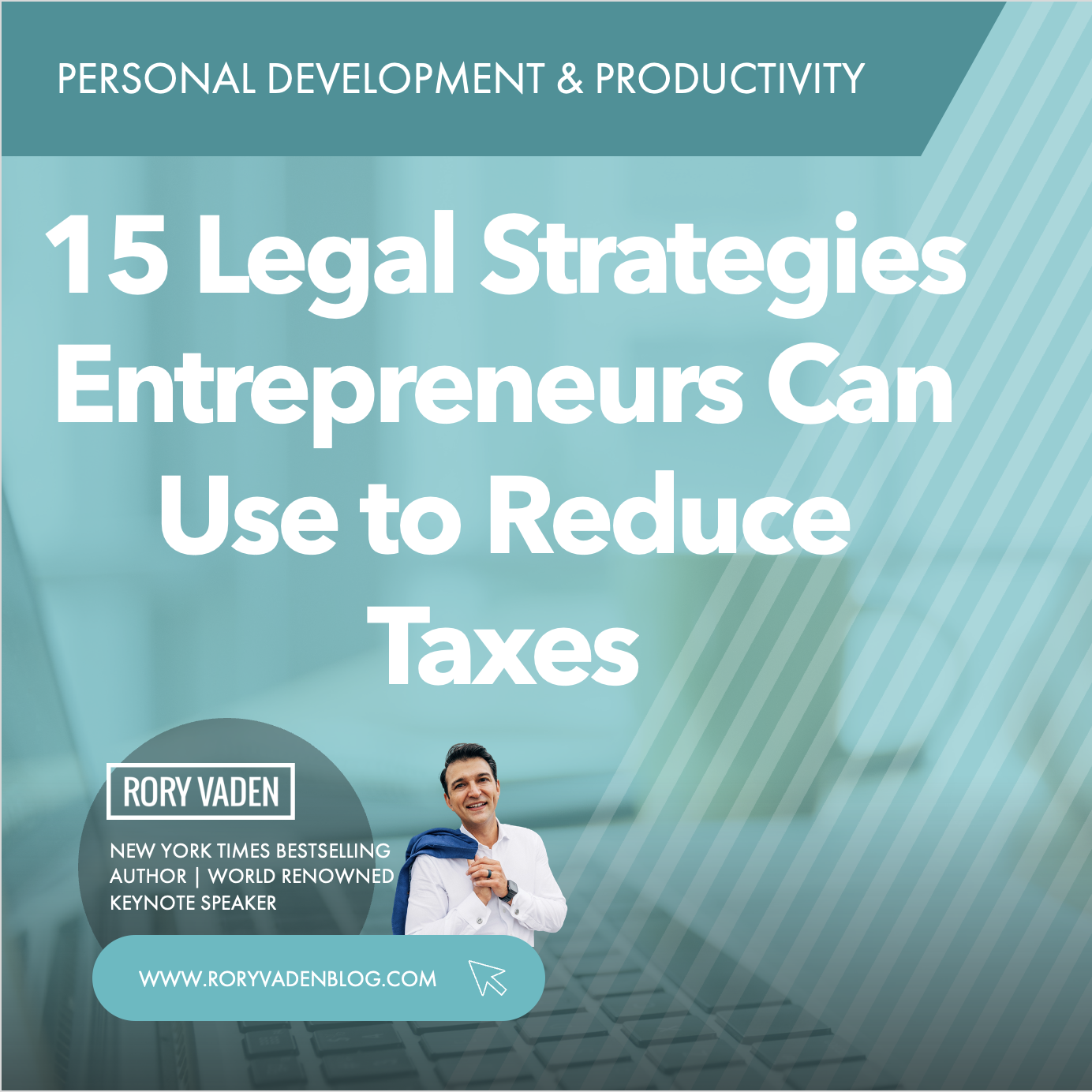“The only two certainties in life are death and taxes.” -Benjamin Franklin
But what if I told you could pay less taxes without breaking the law? That’s exactly what Henry Yoshida and I went over in our latest conversation.
That conversation is what inspired me to write this article on the 15 legal strategies you can use to reduce your taxes.
But, before we start, I want to say I am not a tax expert! I’m just an entrepreneur trying to get the good word out about legal strategies to pay less tax. Speak with a tax professional before implementing any of these strategies!
So let’s get started!
Retirement Plans
As a business owner, you can provide a retirement benefit for your employees.
Think of a 401k. But when you are an employee of the company, there are certain plans that allow you as the owner, to maximize or create large contributions to your retirement account.
So it doesn’t pad your pocket with money in the short term.
In fact, it takes money out of your pocket, because you’re putting it into retirement instead of putting it into your checking account.
But it allows you to have to contribute much more than you would normally be allowed to with something like a Roth IRA because those have income limits.
If you’re an entrepreneur with a successful business, you can provide this awesome benefit to your employees and it gives you a vehicle to put away more money for retirement.
Legal Structure
If you’re making a profit, the legal structure of your entity dramatically affects your tax liability and your tax implications.
If you are an entrepreneur and you have a fairly successful business, look at the structure of an LLC filing as an S corporation.
So a lot of times a business starts as a Sole Proprietor, then at some point, you become an LLC.
But an LLC filing as an S corp. gives you tax advantages.
Training Companies
If your company professionally trains people, you can get a 199A Deduction. Go to the IRS website, look up 199A, and look for the FAQs.
Understanding this deduction can give you major tax advantages that can go up to 1000s of dollars a year.
But there are certain things you have to do to qualify as a legitimate training company.
The Augusta Rule
The Augusta rule states, and don’t quote me on this, that you can rent your home 14 days a year tax free.
This rule originates from the Masters Golf Tournament in Augusta where people rent their homes out during the tournament and make a bunch of money.
The Augusta rule allows you to rent your own home to your business.
If your business has meetings and you have to rent boardrooms or meeting spaces, you can use your home instead.
And those 14 days worth of “rent” can be tax free.
But you have to take meeting notes that say, “I had this meeting in my house on this date. This is what we talked about. And this is a meeting that we would have had somewhere else i.e a hotel. And rather than doing that, I’m taking it as a tax deduction for my taxes.”
DAF (Donor Advised Fund)
When you make charitable contributions, the government allows you to deduct that from your taxable income.
But let’s say you have a bunch of money coming in one year and you’re sitting on a pile of money and you’re not sure who you want to donate that money to, but you don’t want to pay taxes on it.
A DAF allows you to put your money aside and earmark it for charitable giving.
And you can take the tax deduction now so you don’t get taxed this year. But then you have to give that money later.
So again, it’s not like it’s some magic way of keeping money in your pocket.
It’s just saying, “Rather than paying money to the government, I’m gonna pay money to causes that I care about so I can reduce my tax liability.”
And the government does that on purpose. It’s not like you’re sneaking one past them.
What they’re doing is they’re incentivizing business owners and people of wealth to invest into and give money to things that make the world a better place.
QEAAP Bonuses
The QEAAP rule (Qualified Employee Achievement Award Program) allows you to make up to $1,600 as a deduction for any gifts.
So, instead of paying them $1,600 in income of which you have to pay payroll taxes on and they have to pay income taxes on, give it to them in the form of a bonus.
Again, it doesn’t put more money in your pocket, but it prevents you from paying taxes on up to $1,600 per employee.
This is why entrepreneurs get tax breaks, because the government knows you’re stimulating the economy and helping stabilize the country.
You’re creating jobs, which means you’re giving income to people, which means there’s less dependency on the government for their income, health, and retirement.
Employee Expense Reimbursements
If your employees are traveling for work, use a cell phone for work calls, or even, I believe, exercise in certain gyms like the YMCA, you can reimburse your employees for those certain expenses.
And then you get those as a tax deduction.
You don’t have to pay payroll taxes on that money, but you’re still transferring money from the business to your employees.
The Hummer Rule
The Section 179 Deduction is known as the “Hummer Rule.” And according to the internet, this means that people can go out and buy Hummers and get 100% of that as a tax deduction.
Is that real?
Sort of…
It is real for now but it seems like it might disappear soon.
This rule states that vehicles that have a gross vehicle weight rating of more than 6000 pounds can be written off.
So if you buy a vehicle that weighs over 6000 pounds that’s considered to be a commercial vehicle for your business, you could take 100% of that amount as a deduction in the year that you made that purchase.
Vacations
To my knowledge you can take deductions for vacations if more than 50% of their duration is for work.
So you have to be doing work related activities more than 50% of the time.
For example, if I’m going to Miami, I’m going to set up work meetings on Friday and on Monday, and then I’ll just stay there Saturday and Sunday.
All of a sudden, that becomes a business trip that I can write off.
Video Production Companies
I almost didn’t put this one on the list, because we’ve never done this. So I would approach this one with extra caution.
If you have a licensed video production company, anything that you buy that shows up in your videos can be deducted because it’s considered a part of the set design.
I’m sure it’s not anything you buy, it’s probably not cars, houses, or helicopters.
There are probably limitations to this. But a lot of times, it’s much more flexible than you realize.
Hire Your Kids
As long as your kids have an actual job with a job description and certain formalities that establish them as an employee of the company, they can help you decrease your tax liability.
At the time of writing this, you can pay your kids $12,500 a year each and they don’t have to pay taxes.
Why?
Because nobody has to pay taxes on their first $12,500 per year.
How does this save you money on taxes?
It’s basically a way that you can get money to your children with pre-tax dollars instead of after-tax dollars.
Now, that money has to go to them, it cannot be money that you use, otherwise it’s illegal.
They can use that money to pay for schooling, sports, or possibly even toys.
And the reason it’s an advantage is you’d be paying that money anyways.
Logos
Anything with your logo on it is considered a uniform or advertising expense, including clothing.
You can’t see me, but I’m wearing a Brand Builders Group sweatshirt. That piece of clothing can be 100% tax deductible.
There are some limits here, like putting a logo on your car doesn’t necessarily mean you can just write off the whole car. But this is a great way to advertise your business and get a tax break too.
HSA (Health Savings Account)
Think of it like an IRA. When you put money into your HSA, you don’t get taxed on the money you put in there.
Now, here’s the catch, all of that money has to be used for health expenses.
So when you put money into your health savings account, you have money that is earmarked, only health expenses, until you’re over a certain age.
Notice the theme here, the government is incentivizing you to invest in things that will provide for you long term.
That’s why these things are all legal.
Now, these last two strategies will sound crazy.
But these are ways that you can actually legally avoid paying certain taxes at all.
Puerto Rico Act 22
We have several friends who have moved to Puerto Rico because of this rule.
Puerto Rico Act 22 allows you to pay a flat tax rate of 4%, if you’re a primary resident of Puerto Rico.
And you do that by living in Puerto Rico for more than 183 days a year. Your bank account, place of worship, primary mailing address, driver’s license, all have to be there in order to become a legit Puerto Rican resident.
And the cool thing is that Puerto Rico is a US controlled territory, so you’re still under the protection and the rule of the United States.
Yes, there are some downsides to doing this like not being able to vote during elections, but you get to go from a 40% or even 50% tax bracket to 4%.
So you can almost double your income just by moving.
Going Public
If you do this, you can literally become a millionaire and never pay any taxes.
How does this work?
As an entrepreneur, you start a company, grow that business, and then you can take that company public.
Once you take that company public, you now have stock that is worth real money.
And what a lot of billionaire founders do is they take a loan against that stock from a bank and never pay taxes.
They’re using their stock as collateral to take a loan from a bank.
If they were to sell the stock they would have to pay taxes on it.
So they’ll take a loan from the bank, hold up the stock as collateral, and never have to sell the stock.
Yes, they’re paying interest on that loan, but it pales in comparison to what they would pay in taxes to the government.
There you have it, 15 legal ways to save money on taxes.
Share this with an entrepreneur that you know who needs to save money on taxes!

















